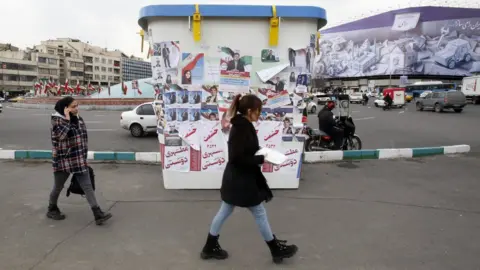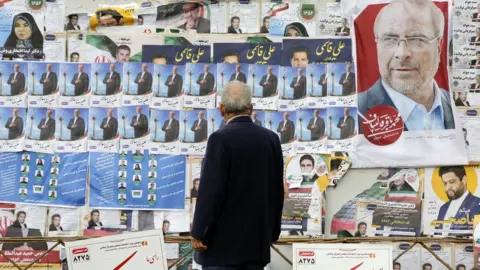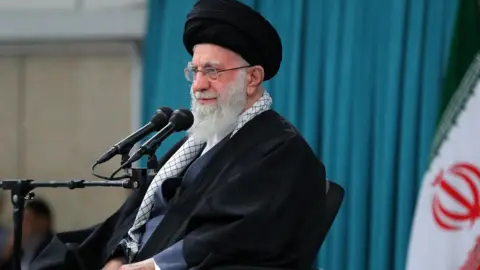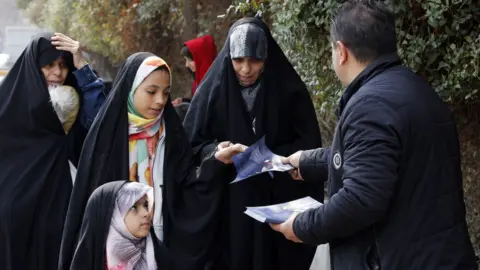Iran elections: First polls held since 2022 nationwide protests
 EPA
EPAThe first elections in Iran since the nationwide anti-government protests of 2022 take place on Friday.
There will be two separate polls: one for members of parliament and the other for members of the Assembly of Experts, who are responsible for appointing, dismissing, and overseeing Iran's Supreme Leader, the country's most powerful figure and commander-in-chief.
The elections are seen as a crucial test for assessing the legitimacy of the Islamic Republic's regime.
Is there a choice?
In Iran, candidates for the presidency, parliament and Assembly of Experts must be approved by the Guardian Council, a body of clerics and jurists in which individuals appointed by the current Supreme Leader, Ayatollah Ali Khamenei, play a significant role.
In the years following the disputed presidential election of 2009 - which was followed by widespread street protests and a violent crackdown on dissent - candidates who expressed even the slightest criticism of how authorities responded to protests, supported reformist candidates or doubted the integrity of elections were disqualified. They included four former presidents and many other prominent political figures.
 EPA
EPAIn the upcoming parliamentary election, a record 15,200 candidates have been allowed by the Guardian Council to stand for the 290 seats. However, only 30 candidates from the reformist camp who applied have been approved - a notably low number.
Conservatives have dominated the parliament since 2004 and are expected to be returned in similar numbers.
In previous parliamentary elections, the reformist faction always tried to find representatives close to them among the approved candidates. They also consistently encouraged people to participate in elections.
Now, for the first time, they have stated that they cannot be part of an election that they consider "meaningless, non-competitive, unfair, and ineffective in the administration of the country".
Will it change anything?
If social freedoms and economic conditions are important to voters, elections play a minimal role in affecting change.
The principal decision-maker on these issues is neither the parliament nor the president, but the Supreme Leader. Iran's foreign policy, the primary factor affecting the economic situation, is decided by Ayatollah Khamenei, and he has shown no willingness to compromise or retreat on social freedoms.
Currently, the government, parliament, judiciary and Assembly of Experts, are in the hands of individuals approved by the Supreme Leader.
This, combined with the Guardian Council's disqualification of reformist and moderate candidates, has led many to predict a low turnout among voters on Friday.
A comparison of the past 11 parliamentary elections reveals that the last one in 2020 had the lowest voter turnout of 42%. Turnout had been consistently above 50% before then, with 62% recorded in 2016.
 EPA
EPAThe last presidential election in 2021 also set a record for the lowest turnout, with about 49% of those eligible casting a ballot.
Some 3.7 million "invalid" ballots were also cast - the second highest number of votes after Ebrahim Raisi, the winning candidate, and the most cast in any presidential poll since the 1979 Islamic Revolution.
At the same time as voter participation has decreased, the frequency of protests in Iran has increased.
Two other nationwide protest movements emerged in 2017 and 2019, both of which were brutally suppressed by the government.
Another issue of concern for the conservative-dominated government is that staunch supporters of the Islamic Republic, who have traditionally participated in elections, have become increasingly critical of its policies.
This group, which forms the social base of the power structure in Iran, now says the government's consolidation and the rise of revolutionary forces considered to be "in line with the leadership" have not led to change or reform.
The speeches of conservative students, who are occasionally taken to meet Ayatollah Khamenei, are filled with complaints about poor economic and social conditions, as well as what they see as government policies based on expediency and inaction towards the West and Israel.
For this reason, the Supreme Leader has attempted to boost turnout among his supporters by framing voting as a matter of religious faith. He stated: "Elections are a duty, and anyone who opposes the elections is opposing the Islamic Republic and Islam."
Authorities are trying to maintain that the elections will be free and fair, but what remains in practice has called that into question.
What do voters think?
Despite the abundance of electoral advertisements in the streets, the atmosphere in Iran these days lacks enthusiasm, indicating voter apathy. Some government surveys show that half of the participants were even unaware that two elections were taking place.
The protests of 2022 - which were triggered by the death in custody of Mahsa Amini, a young woman detained by morality police for wearing "improper" hijab - were harshly suppressed by the government.
Hundreds of people were killed and thousands more injured. Many of the thousands of protesters who were arrested remain in prison, and some have received severe sentences, including the death penalty, after what human rights activists have condemned as "sham trials".
 EPA
EPAAfter these protests, the political and social atmosphere became more repressive than before.
Alongside this domestic crackdown, the economic situation continues to deteriorate daily, leaving people's tables emptier.
The Central Bank of Iran reported an inflation rate of 56% in the last month of autumn, after not publishing figures for six months.
The government has failed to fulfil its economic promises, and its foreign policies have inflicted successive shocks on Iran's frail economy, already burdened by severe sanctions imposed by Western powers over Iran's nuclear programme .
Such conditions have increased public dissatisfaction and despair.
